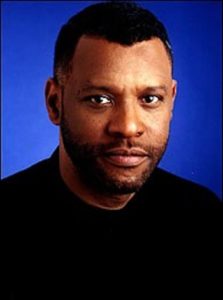
Ralph Wiley
*Ralph Wiley was born on this date in 1952. He was a Black journalist and author.
From Memphis, TN, he was the son of Ralph H. Wiley (a night watchman) and Dorothy Brown (a professor). Though his father died when he was young, Wiley had strong male role models. Both of his grandfathers were Methodist ministers; his three uncles were morticians, maitre d'hotel, and prizefighters. Wiley's mother held a master's degree from Northwestern University and taught at the Baptist Owen College in Memphis.
In high school, he was placed in the gifted and talented class. Wiley ran track, played football at Melrose High School in Memphis, and started college to play football. But after injuring his knee, he focused his energy on his studies. Wiley's high SAT scores won him a scholarship to Brown University, but he chose instead to attend Knoxville College in Tennessee, where he earned his B.S. in Business in 1975. Wiley married Brenda Joysmith (they divorced in 1978). He married Holly Anne Cypress in 1982; his child is Colen Cypress Wiley.
As a journalist, Wiley's writing career had a slow start. While at Knoxville, he reported on sports for the local Knox County News' black edition, the Knoxville Spectrum. Although it was a good learning experience, Wiley commented in his book Serenity: A Boxing Memoir, "I wrote terrible stories and worse columns." His experience in Knoxville did not land him a job directly after college. He spent three months in Chicago, where he was rebuffed in his efforts to work for a Black publisher.
His career started in Oakland, California, where he worked as a copyboy for the Oakland Tribune. As a copyboy, he wrote in Serenity he "learned what was considered news and what was not." After working at the Tribune for a year, the sports editor allowed Wiley to write an article. The National Basketball Association and the American Basketball Association were about to merge, and the paper needed an article about Julius "Doctor J" Erving. Wiley's success with his "Doctor J" story won him a position as the paper's prep sports writer. After working the city beat from 1975 to 1976, he was transferred to the Tribune's sports department to cover boxing.
By 1979, Wiley had his column with the paper. He covered the Oakland Raiders football team and the Oakland A's baseball team and traveled the country to report on championship boxing. Wiley coined "Billy Ball" for how Billy Martin managed the Oakland A's. His boxing reports captured some of the best bouts in history. He wrote about Larry Holmes's defeat of Muhammad Ali, the title fights between Sugar Ray Leonard and Roberto Duran, and Tommy Hearns's loss to Sugar Ray Leonard. About the Hearns and Leonard fight, he wrote in Serenity that he "never saw a better fight."
Wiley left the Tribune to join the staff at Sports Illustrated in 1982. He felt his Tribune editors disliked him, but he could not tell if they disliked his writing or his race. Over time, Wiley found friends at Sports Illustrated who appreciated his writing. He was named senior writer and penned cover stories and features on numerous professional and collegiate athletes, including Bo Jackson, Patrick Ewing, Muhammad Ali, and Raghib "Rocket" Ismail. Wiley authored his first book, Serenity: A Boxing Memoir, in 1989.
Writing from his boxer uncle Charles' point of view, Wiley populated his book with famous boxers such as Muhammad Ali, Joe Louis, Mike Tyson, Sugar Ray Leonard, Tommy "Hitman" Hearns, and Roberto Duran. He also profiled trainer Emanuel Stewart, who meditated on Las Vegas as a boxing town. He recounted the events leading up to the ring death of South Korean lightweight Duk Koo Kim and the suicide of referee Richard Green. Serenity is "as much an autobiography as a survey of the boxing world," wrote the Los Angeles Times. The book contains Wiley's recollections of family and friends and his insights into the effects of racism and poverty on boxers and boxing. A reviewer for the New York Times commented, "The book is about growing up in a world where you had to defend yourself to survive."
Wiley left Sports Illustrated in 1991 and published "Why Black People Tend to Shout," a sometimes humorous and often scathing and sarcastic view of racism in America. In 1992, Wiley collaborated with film director Spike Lee on By Any Means Necessary: The Trials and Tribulations of the Making of Malcolm X. Wiley had long wanted to work with Lee, sending him his books and letters and shipping him prospective film scripts. Wiley again mused racial tension in America in his 1993 publication, What Black People Should Do Now: Dispatches From Near the Vanguard. Wiley noted that black people should stop singing "Ain't Gon' Let Nobody Turn Us Around" and "We Shall Overcome" and start singing "Ain't Gonna Let Nobody Run a Better Business Than Me" and "We Shall Not Buy From Racists."
Wiley worked on novels, contributed to nationally distributed magazines, and appeared on television talk shows like Geraldo and Larry King's Life. He has authored a television documentary, The Other Side of Victory, a three-act play, Cardinals, and a screenplay, Knuckle Down. Ralph Wiley died from a heart attack on June 17, 2004.